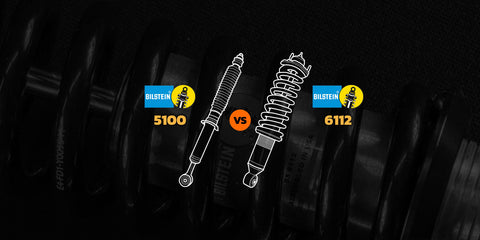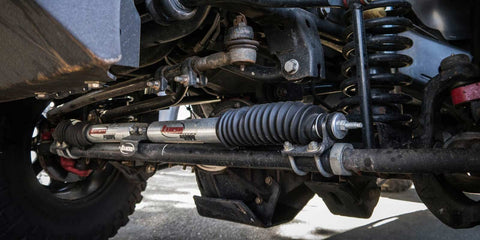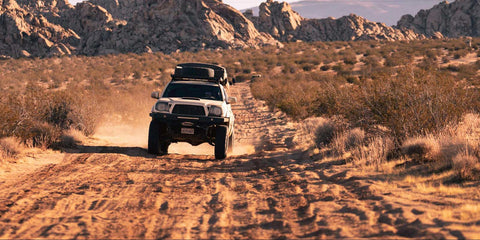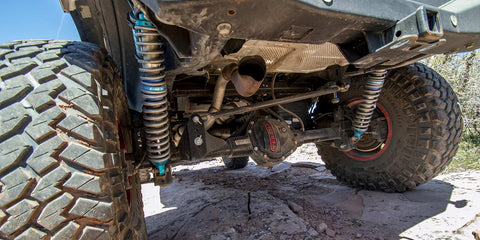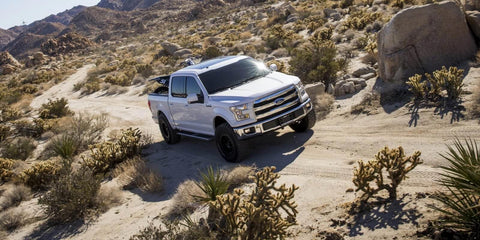Ride Rundown SEMA Edition Part 3 - Old School Off-Road Reimagined
Posted by Brandon Sevestre on
No question, there’s a certain je ne sais quoi about the raw unmuted way older cars wallow along the road, but wouldn’t it be much better if the thing boogied? Especially if you can still retain just a little bit of that soul. I know many of you out there have something a little older, and probably a lot more rad, than what is typically on today’s roads. Surely it feels more special behind the wheel, but you may not be out on the trail as often as somebody driving something more modern; something that’s probably a whole lot easier to drive and certainly more comfortable.
But, you are not sentenced to a life of getting bucked by stagecoach suspension, sawing your way through highly suggestive steering, or simply not keeping up. Like the Six Million Dollar Man, 'We Have The Technology'; if you have the creativity, budget, and have the skills and tools (or at least know somebody with them), you too can have the bionic man equivalent of an old school rig.
Ride Rundown - Bronco Factory Bronco II
For years the TTB (Twin Traction Beam) era of Ford four-wheel drives was somewhat underappreciated as they do not have the same reputation for durability of a solid axle or the modern drivability of double-wishbone independent suspension. However, they have always shined brightest in the desert. Nothing is as easy to pull huge suspension travel from while retaining 4WD. Every day there are more options for what are essentially bolt-on kits that will far exceed the travel numbers and performance of pretty much any basic long travel kit for your average modern A-arm truck. As that market for parts grows, so does the desire for TTB trucks, with prices even skyrocketing on the once mocked baby Bronco IIs.
This stubby little whoop eater features a Dana 35 that has been extended 4” on either side as well as a custom set of leaf springs to get a full 17” of useable travel front and rear while still retaining 4WD. Finishing off the setup is a set of King 2.5 coilovers and bypasses tuned specifically for the application and bolted up to shock hoops. Besides the cage and tube work tying everything together and extending the TTB, this suspension could be done with primarily bolt-ons, making these beam rigs one of the cheapest and easiest options for putting together a desert runner that still has the capability to wheel you down tough trails.
Even if you wanted to stay at stock width and to avoid extending your front axle, it is easy to cycle 12”+ on Dana 35 front ends and 15”+ on full-size Dana 44 front ends with simple mid-travel kits. The hardest part to put together for these setups is the shocks, as none of this will be an off-the-shelf bolt-on shock. Once you get your hoops in, give us a shout, and we can walk you through getting the right set up tuned for your specific needs from great brands like Fox, King, or our favorite new kid on the block, Carbon Shock Technologies.
Ride Rundown - A Real Deal Vintage Gladiator
During the Kaiser and AMC days, the full-size Jeep platform was a groundbreakingly off-road capable pickup. This was in the days when, sans the Ford High Boy and various pseudo factory conversions, a 4x4 pick up was rare. Although modern for their era, it is no secret that your average 4wd truck has moved pretty far ahead of these old SJs. This gorgeous ‘68 model bridges the gap while still keeping the killer vibe of a lot of builds of the early ‘70s.
From the modest addition to the stock flares and meaty step side bed to the classic-yet-functional roll bar that ties in the rear suspension, spare, and trans cooler mounts, this FSJ easily hides its modern underpinnings with a ton of vintage flare. Underneath the sweet sheet metal, tubework, and trim is a 3 and 4 link suspension setup. Paired with custom Radflo coilovers and bypasses, this Gladiator not only bridges the gap to its modern counterpart, one could say it jumps it in terms of suspension.
The beauty of many classic 4WDs and especially full-size trucks is that they have a lot of room for activities, making packaging any engine, suspension, or any custom addition to your rig much more simple than a modern vehicle. Sure you can not simply bolt on a set of shocks and keep up with your average late-model pickup, but the extra space and simplicity of a classic rig make doing truly custom stuff a whole heck of a lot easier.
Ride Rundow - A Tastefully Built Classic Toyota FJ
It is no secret that the stock F series inline 6 and B series diesel 4 banger these FJs were bestowed with are anemic. That said, it is very apparent that the heart of this build was the chooch machine Cummins 4BT and big turbo under the hood. In most cases you usually get the most benefit in ride and handling from linking the front instead of the rear, with the amount of torque going to the rear axle, it would be nearly impossible to avoid axle wrap on a set of springs with enough lift and travel to suit this build. Sure, you can add a set of anti-wrap or traction bars with the spring, but not only will you be adding cost, but it is also pretty hard to avoid binding that would limit articulation off-road. Besides, it can be relatively counterintuitive to attempt to improve a leaf-sprung setup by adding links, especially when you can just link it from the start. Let’s be honest. They may not ride and handle the best in the front, but this little Land Cruiser will still articulate and have more than adequate traction when the trail gets a little flexy. Plus, seeing those leaf springs hanging out the front does blend well with the retro vibe!
Although nearly every piece of this rig was touched, the builder only went as far as necessary for their specific needs. Would a triangulated 4 link, coilovers, and bypasses help fly down the trail a little better? Sure. Yet that is clearly not the purpose of this rig. The most important thing you can ask yourself when building something is, "How I am really using this vehicle?" and "How do I plan to use it?". Your overland or rock crawler build doesn’t need 5 tube bypass King Kong 4.0s to work on the trail. Be honest with yourself and your vehicle, and focus on improving on what is genuinely critical for you and the way you drive. Other people may look at it and comment on how they would do something differently, but at the end of the day, it’s your rig, not theirs.

